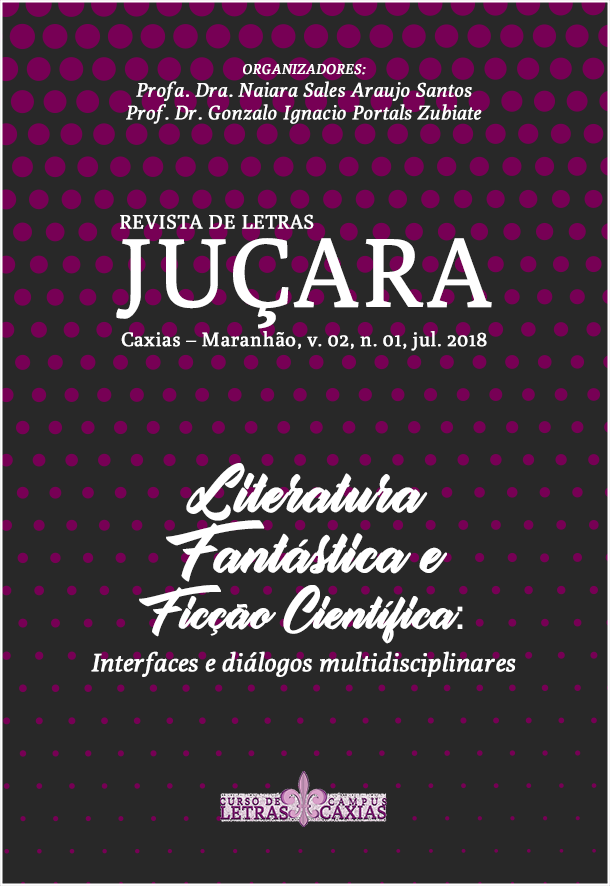A CONVERGENCE OF GENRES: GOTHIC AND SCIENCE FICTION IN FRANKENSTEIN
DOI:
https://doi.org/10.18817/rlj.v2i1.1531Resumo
This article aims to analyze the novel Frankenstein, by Mary W. Shelley, from a perspective of literary genres. The work is believed to manifest both traits of the Gothic genre––due to its structure and common themes to the period it was published––and of what would in future be called the Science fiction genre. Those elements are here observed, in the novel as well as in the context of its creation. In this sense, there is a convergence of genres taking place, albeit one of them is in its nascent form: Shelley's novel antecipate a scientific interest that would be specified in later fiction, being derived from her legacy. Tzvetan Todorov's perspective is considered, inasmuch as he defends the presence of multiple genres inside a work of fiction, as well as the creation of new literary genres from other, pre-existent, ones. It is concluded that the novel manifests enough elements to comprise both the genres here discussed, with its common and different traits.
Referências
BALDICK, Chris. In Frankenstein's Shadow: Myth, Monstrosity and Nineteenth-century Writing. Oxford: Clarendon Press, 1987.
BRANTLINGER, Patrick (1980). "The Gothic Origins of Science Fiction". In: NOVEL: A Forum on Fiction, Vol. 14, No. 1, p. 30-43.
FLORESCU, Radu (1998). Em Busca de Frankenstein: o Monstro de Mary Shelley e Seus Mitos. Translated by Luiz Caros Lisboa. São Paulo: Mercúrio.
FREUD, Sigmund (1976). “O Estranho” In: Edição Standard Brasileira das obras psicológicas completas de Sigmund Freud. Vol XVII (1917-1919). História de uma neurose infantil e outros trabalhos. Traslated Jayme Salomão et al. Rio de Janeiro: Imago.
GERNSBACK, Hugo (ed.) (1926). Amazing Stories. Vol. 1. Nº 1. New York: Experimenter Publishing Company.
HEILMAN, Robert B. (1967). "Charlotte Brontë's 'New' Gothic". In: RATHBURN, C. Robert; STEINMANN, Martin (Orgs.). From Jane Austen to Joseph Conrad: Essays Collected in Memory of James T. Hillhouse. Minneapolis: University of Minnesota Press. (p. 118-32).
JAMES, Edward; MENDLESOHN, Farah (Orgs.) (2003). The Cambridge Companion to Science Fiction. New York: Cambridge University Press.
KINCAID, Paul (2008). "On the Origins of Genre". In: ______ What it is We Do When We Read Science Fiction. Essex: Beccon Publications. p. 13-21.
LEVINE, George; Knoepflmancher, U. (Orgs.) (1982). The Endurance of Frankenstein: Essays on Mary Shelley's Novel. Berkeley: University of California Press.
PUNTER, David (2013). The Literature of Terror. Vol. 1. 2nd ed. New York: Routledge.
RANK, Otto (2014). O duplo. [E-book]. Dublinense. Kindle edition.
ROSS, Sydney (1962). "Scientist: The Story of a Word". In: Annals of Science, Vol. 18, Nº 2, p. 65-85.
SEDGWICK, Eve Kosofsky (1986). The Coherence of Gothic Conventions. New York: Methuen.
SCHOR, Esther (Org.) (2003). The Cambridge Companion to Mary Shelley. Cambridge: Cambridge University Press.
SHELLEY, Mary W. Frankenstein; or, The Modern Prometheus: The 1818 version, Second Edition. (Edited by D. L. Macdonald & Kathleen Scherf). Peterborough: Broadview Literary Texts, 2005.
STEVENSON, Robert L. Strange Case of Dr. Jekyll and Mr. Hyde, and Other Tales (Edited by Roger Luckhurst). Oxford: Oxford World's Classics, 2006.
SUVIN, Darko (1972). "On the Poetics of the Science Fiction Genre". In: College English, Vol. 34, No. 3, p. 372-382.
TODOROV, Tzvetan (1975). Introdução à Literatura Fantástica. Translated by Maria Clara Correa Castelo. São Paulo: Perspectiva.
______ (1976). “The Origins of Genres”, In: New Literary History, Vol. 8, No. 1, Readers and Spectators: Some Views and Reviews, p. 159-170.
WATT, James (2004). Contesting the Gothic: Fiction, Genre and Cultural Conflict, 1764-1832. Cambridge: Cambridge University Press.
WELLS, H. G. (2002). The Island of Doctor Moreau. New York: The Modern Library.
ZIOLKOWSKI, Theodore (1981). “Science, Frankenstein and Myth”. In: The Sewanee Review Vol. 89, No. 1 , p. 34-56.
Downloads
Publicado
Como Citar
Edição
Seção
Licença
A submissão de originais para a Revista de Letras Juçara implica na transferência, pelos autores, dos direitos de publicação. Os direitos autorais para os artigos publicados nesta revista são do autor, com direitos da revista sobre a primeira publicação. Os autores somente poderão utilizar os mesmos resultados em outras publicações indicando claramente a Revista de Letras Juçara como o meio da publicação original.


